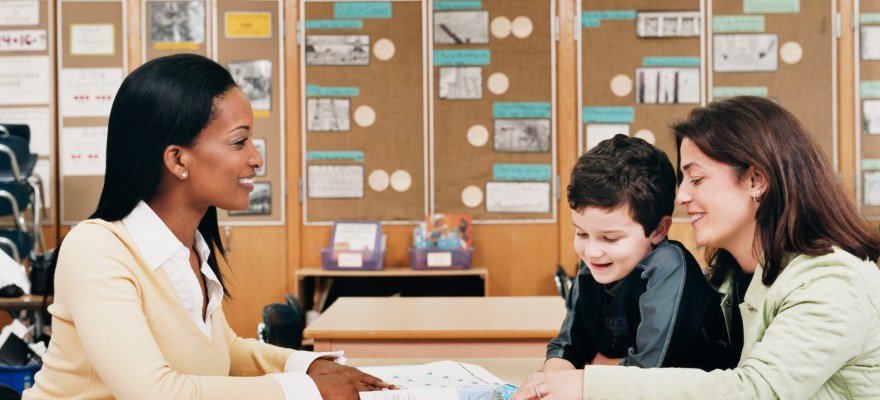
Before the school year wraps up, many schools, including NYC public schools, will hold one more series of parent-teacher conferences. As important as these meetings are, they’re sometimes unintentionally overlooked by parents.
In fact, according to the National Center for Education Statistics, attendance for parent-teacher conferences falls dramatically through the grade levels—from 89 percent in K–2 to 57 percent in high school. Parents who don’t attend these meetings are missing out on pivotal information about their child’s school experience, experts say.
“These meetings help you understand what your child is learning at school, their academic and social-emotional progress and what you can do to support them,” the NYC Department of Education’s website states. “If your child is having particular difficulties, parent-teacher conferences also give you and the teacher time to plan how you can both help them best.”
Jamie Sandoval, project manager at AVID, a nonprofit that provides resources for schools and students, agrees. Parents who meet with their child’s teacher get a good understanding of their child’s progress in the classroom.
“Parent-teacher conferences allow us to immerse ourselves into a child’s whole school experience, while connecting with teachers, arguably some of the most influential people in a child’s life,” Sandoval said. “Too often both parents and teachers feel like they are working alone. These discussions not only help us as parents understand our child’s education, but also bond and build a strong relationship with their teachers. There is strong research that when both parents and teachers develop a strong relationship, the child is more likely to have improved academic achievement, social competencies and emotional well-being.”
The Parent-Teacher Conference: Elementary vs High School
Reports have shown that once a child reaches high school, the number of parents going to open school nights drops. But Sandoval said parents shouldn’t discount the value of these conferences. If anything, these meetings get more important over time.
“Similar to conferences in elementary school, communicating with teachers can alert parents when their child is struggling, before the report cards hit home, or if they’re excelling in their class and need access to more rigorous content,” Sandoval said. “No matter what the situation is, parent-teacher conferences are a vital time of year that I encourage all parents to attend, from one dedicated parent to another.”
5 Tips for a Successful Parent-Teacher Conference
The art of successfully navigating a parent-teacher conference can be challenging. But there are many ways parents can achieve this. For starters, the DOE website includes a conversation guide parents can use during these meetings. Sandoval, who’s a mom herself, also shared a few tips for achieving a successful parent-teacher meeting:
1. Get organized: Set yourself and your child up for success
Have a notebook or binder for all things school related. This will turn into a treasure chest of gems over time and allow you the opportunity to teach your child important organizational habits that will only make them more successful as students and future employees.
Include contact information, dates, who was present for meetings, learning outcomes and next steps. Bring the same notebook to every conference. It shows commitment to your child’s learning journey.
If a teacher, administrator or any other school staff promises something, reach out if you don’t get movement. Log the interaction and follow-up as you need to. This notebook will have meeting dates, important notes, discussion points, and decisions logged. If you need to follow-up, this resource will make it so easy to communicate every decision up to this point.
2. Be intentional: Give your child a head start
Work with your child before the new school year to set goals, expectations and what they hope to accomplish. Create goals for the year. They don’t need to only be academic. Include a goal for extracurricular activities or friendships. This is a fun thing to do with your child, especially as you move from year-to-year reflecting, refining and creating new goals.
Elementary school students can begin with setting two or three goals a year. They can add to the number of goals as they progress to middle and high school. Collaborative goal setting allows the opportunity for meaningful and open conversations with your child about the things that matter most to them. Will it make the argument about homework disappear? Probably not. But it might make it an easier argument.
If there is something important to talk about with your child’s teacher, don’t wait for the school’s official parent-teacher conference dates to roll around. That schedule might not best meet the needs of your child. You can schedule a parent teacher conference anytime.
3. Language matters: Choose your words thoughtfully
Words matter because they convey emotions, ideas, and have different meanings for every person. Choose words that speak to collaboration and working as a team.
4. At parent-teacher conferences, sharing is caring
You have known your child longer and have a far better sense of who they are. Collaboration means sharing in the learning journey, learning what you can about your child from the perspective of their teacher is powerful. Take time to listen, really listen, to what this year’s teacher has to say. Their perspective is important because it is grounded in the present.
5. Trust your instincts: Be an advocate for the education your student needs
As parents and guardians, we have the opportunity to be the adult we needed someone to be for us. If something feels off, it probably is. Don’t be afraid to push a little. It’s okay to ask questions and to ask follow-up questions.
You can also volunteer or visit the classroom if possible. Find out what resources are available on campus, in the district or community. Also, use your parent-teacher conference as a time to ask for the things you or your student need, like tutoring, testing accommodations, technology or language translation for the conference.
More importantly than any of these tips, Sandoval said, is the reminder that parent-teacher conferences are an opportunity to collaborate with your child and teachers about where they are finding success and where they need support.
“The K-12 learning journey is a process that takes many years and the support of lots of adults to get every student ready for life after they graduate from high school,” Sandoval said. “Whether you are just beginning this journey or well on your way, using this time to partner with the educators in your child’s life is time well spent.”
Wanna read more stuff like this? Get our newsletters packed with ideas, events, and information for parents in Staten Island.






